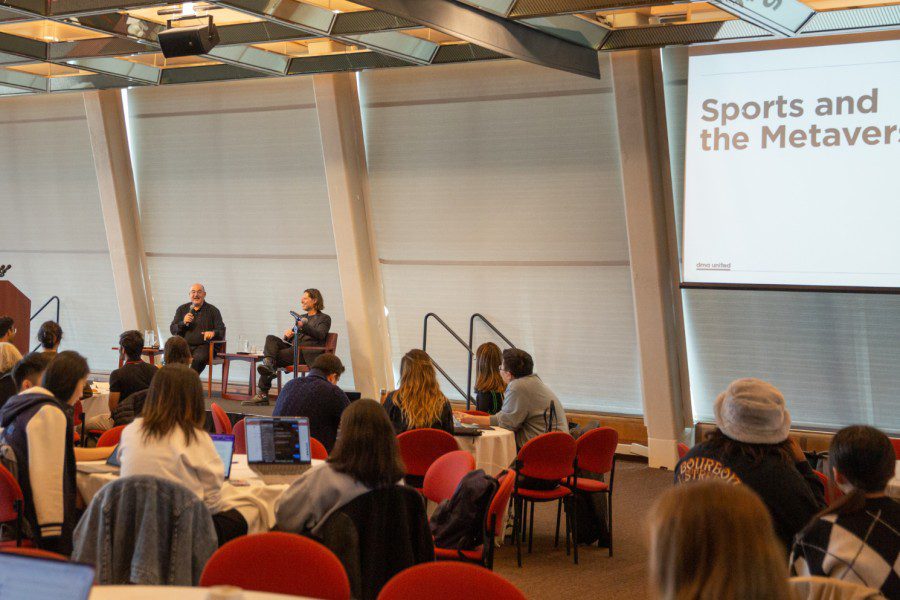‘Metaverse Boot Camp’ draws intrigue and ire
Metaverse experts and NYU students convened to chat about virtual reality, NFTs and the blockchain at a two-day event sponsored by the School of Professional Studies.
The “Metaverse Boot Camp,” an event by NYU’s School of Professional Studies. (Courtesy by Laura Pennace)
October 19, 2022
More than 100 students and faculty made their way to the Metaverse Boot Camp last Friday, on the second day of a two-day event organized by NYU’s School of Professional Studies designed to introduce students to the metaverse and related industries.
The event was hosted by the Metaverse Collaborative, a consortium of professors and industry advisors at the School of Professional Studies. They strive to prepare students to influence the future of the metaverse — a world that exists within the internet and is accessible through virtual and augmented reality technology.
“There’s so much fear of it, but it’s a new way of thinking — a new way of doing things,” said Elizabeth Haas, senior adviser to the SPS dean and the leader of the Collaborative. “We really need to get engaged with this. I really believe it is critical that we set it up for the good, not for the bad. In its forming stage, we can do that much more proactively.”
The metaverse has gained the attention of tech CEOs like Mark Zuckerberg, who changed the name of his corporation, Facebook, to Meta in Oct. 2021 to reflect his desire for it to become a “metaverse company.” Zuckerberg has since invested billions developing the technology — money that has not yet seen a return.
On the second day of the program, attendees gathered for a panel discussion moderated by Marc Beckman, a senior fellow at the Collaborative and an adjunct professor at the Stern School of Business.
Students were also prompted to brainstorm potential uses for metaverse-related technology such as using non-fungible tokens (or NFTs) to modify consumer behavior and improve the technology’s accessibility.
Maria Manuela Chang, a graduate student at SPS who attended the Boot Camp, said that she learned about marketing and business aspects of the metaverse, which she said are not usually focused on in her classes.
“I came with a closed-minded idea of what the metaverse was,” Chang said. “We’re getting educated on the topic and seeing if we like it or not. It’s going to be the future because it connects us all in a certain way.”
Chang said that the event’s speakers discussed the intersections of the metaverse with business, politics, sports, ethical digital practices and virtual reality technology.
Some students participating in the program criticized the speakers for being too optimistic about the metaverse, citing security concerns and public mistrust in organizations like Facebook. E.E.K. Castleton, an SPS graduate student, was particularly unimpressed by the concept.
“There’s our late capitalism hellscape of the NFT that finance bros are going crazy about,” Castleton said. “I’m probably a fringe opinion here in that I very strongly think that that’s dystopian and horrific.”
Castleton explained why they chose to attend the event anyway.
“If it actually is the future, I would like to know what’s coming.”
Since the metaverse gained widespread public attention, critics have spoken out against its potential to bring more of our lives online than ever before, eroding the right to privacy. Some companies have responded by creating privacy-focused metaverse products, such as metaMe, a company that allows individuals to purchase their own data online and control its use.
At the Boot Camp, Dele Atanda, the founder of metaMe, a company that provides an online space where users can package their personal information and then choose which data to share and sell to online advertisers. Atanda spoke about ethics in the metaverse and the focus of his company.
“There’s a phrase that I always reflect on, and it says that the future has already happened, it just hasn’t been equally distributed, ” Atanda said. “In that sense, the metaverse is here. It’s real.”
The extensive Metaverse Boot Camp culminated in its own “graduation ceremony,” during which students received a physical certificate, but were also promised a Proof of Attendance Protocol — an NFT that serves as a receipt — that would be sent to their digital wallets.
Contact Katherine Williams at [email protected].


























































































































































